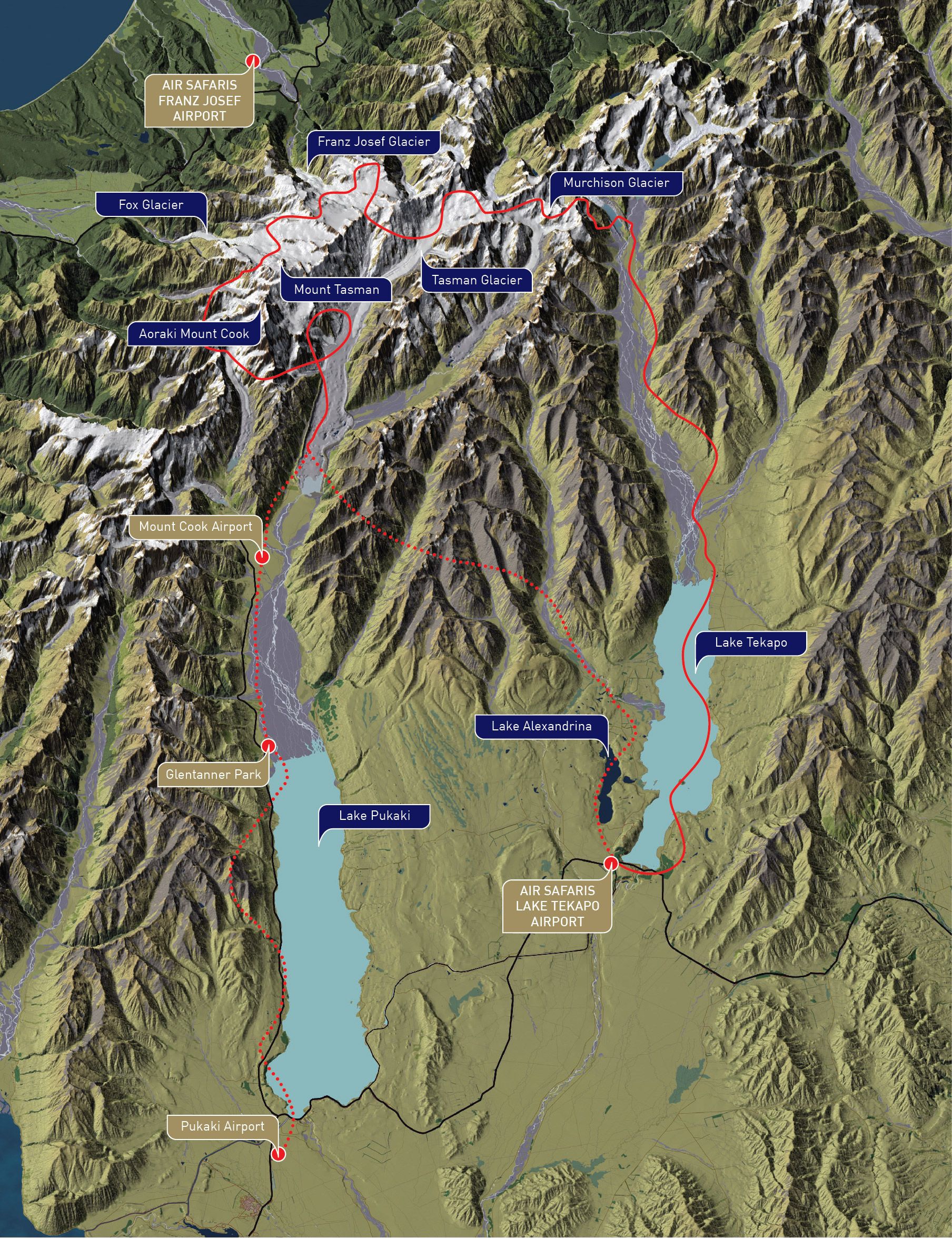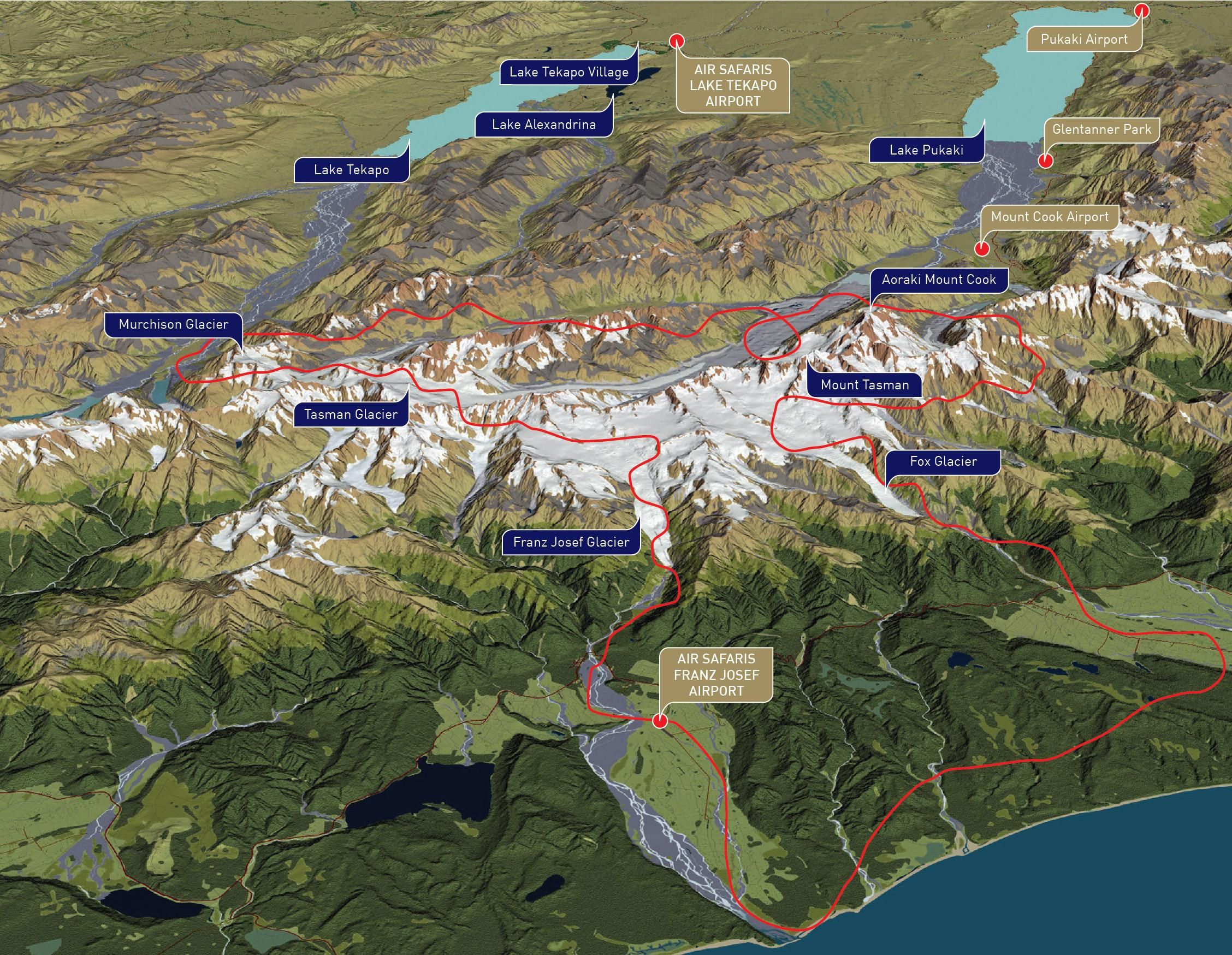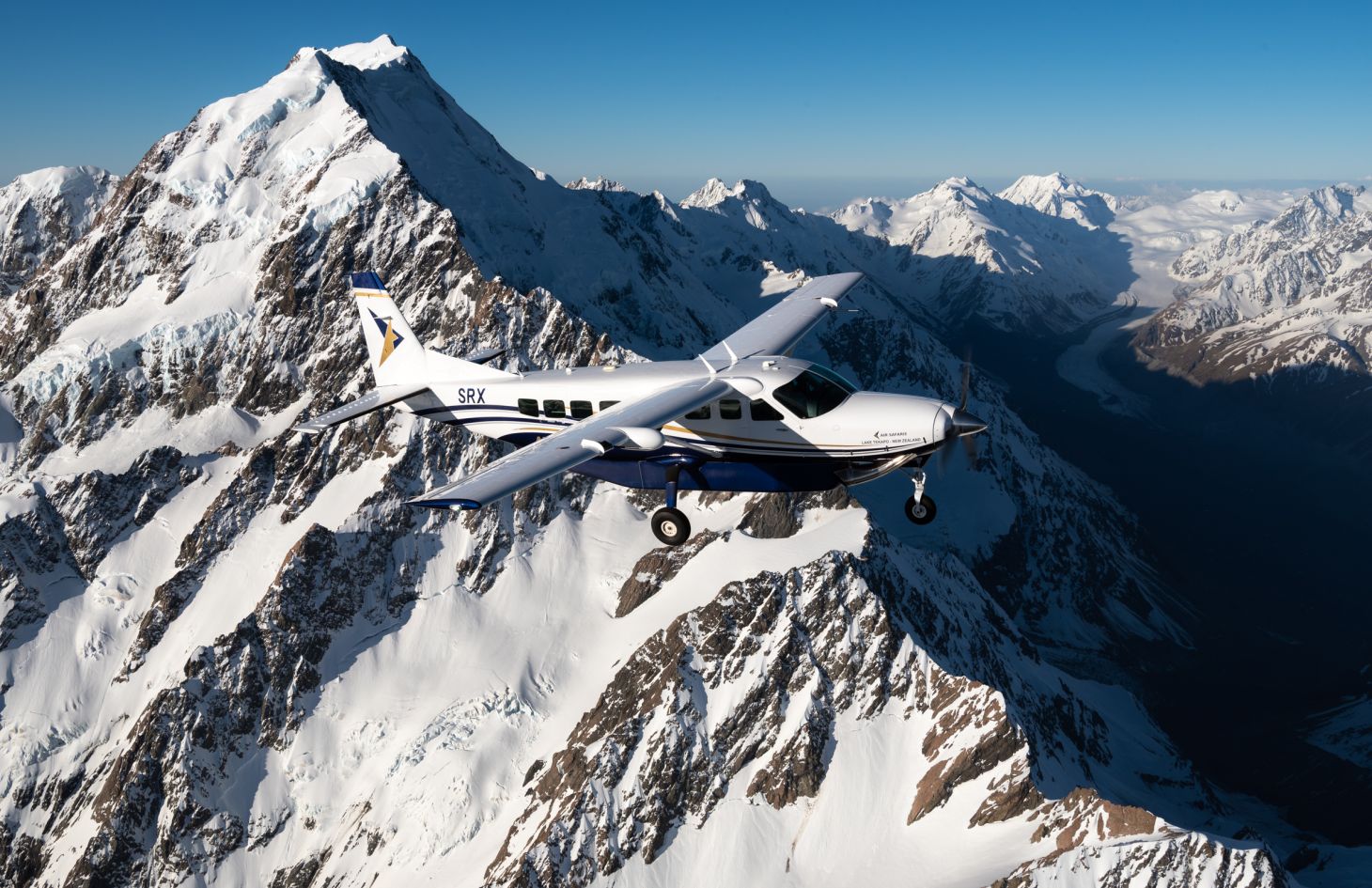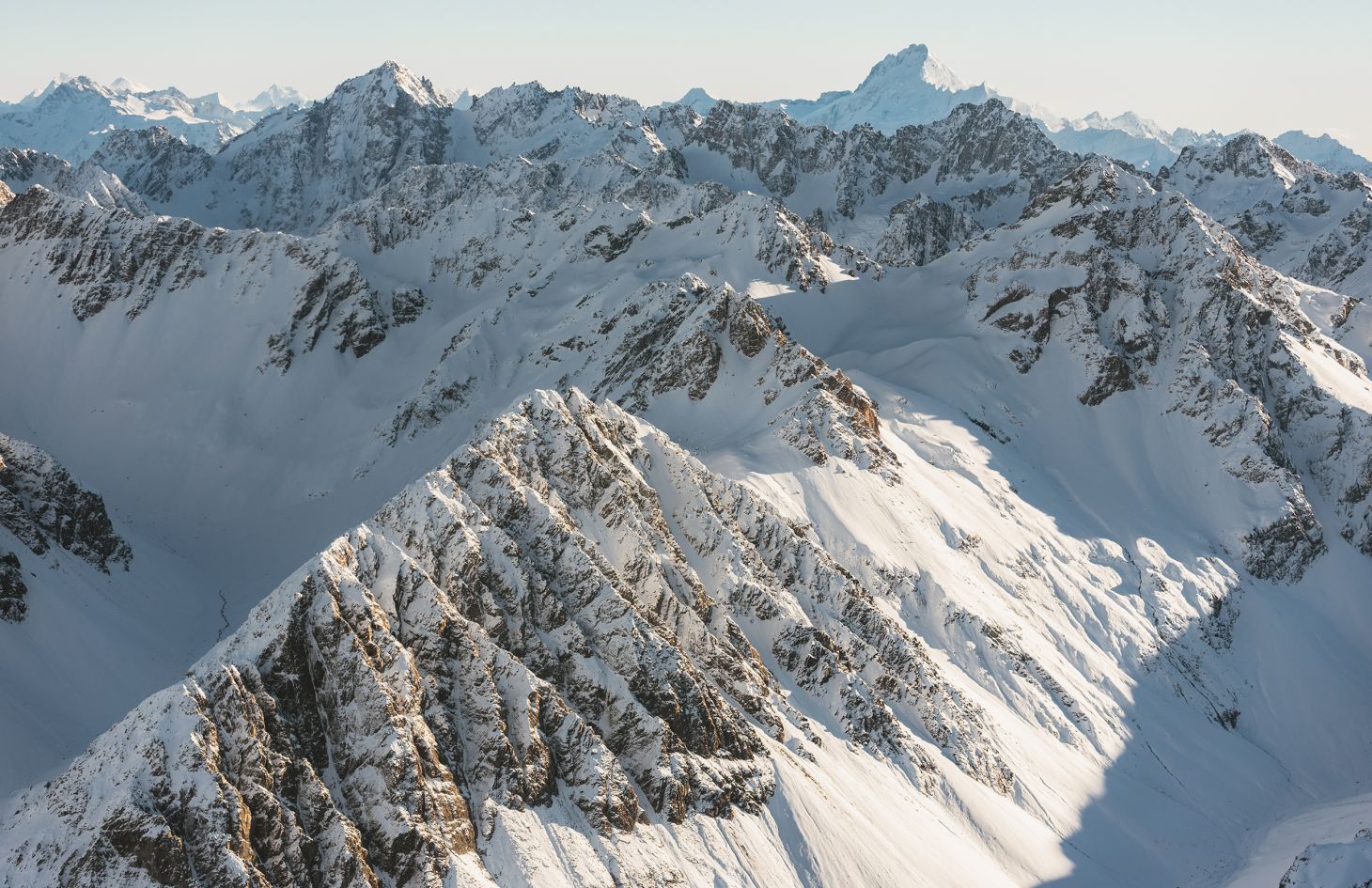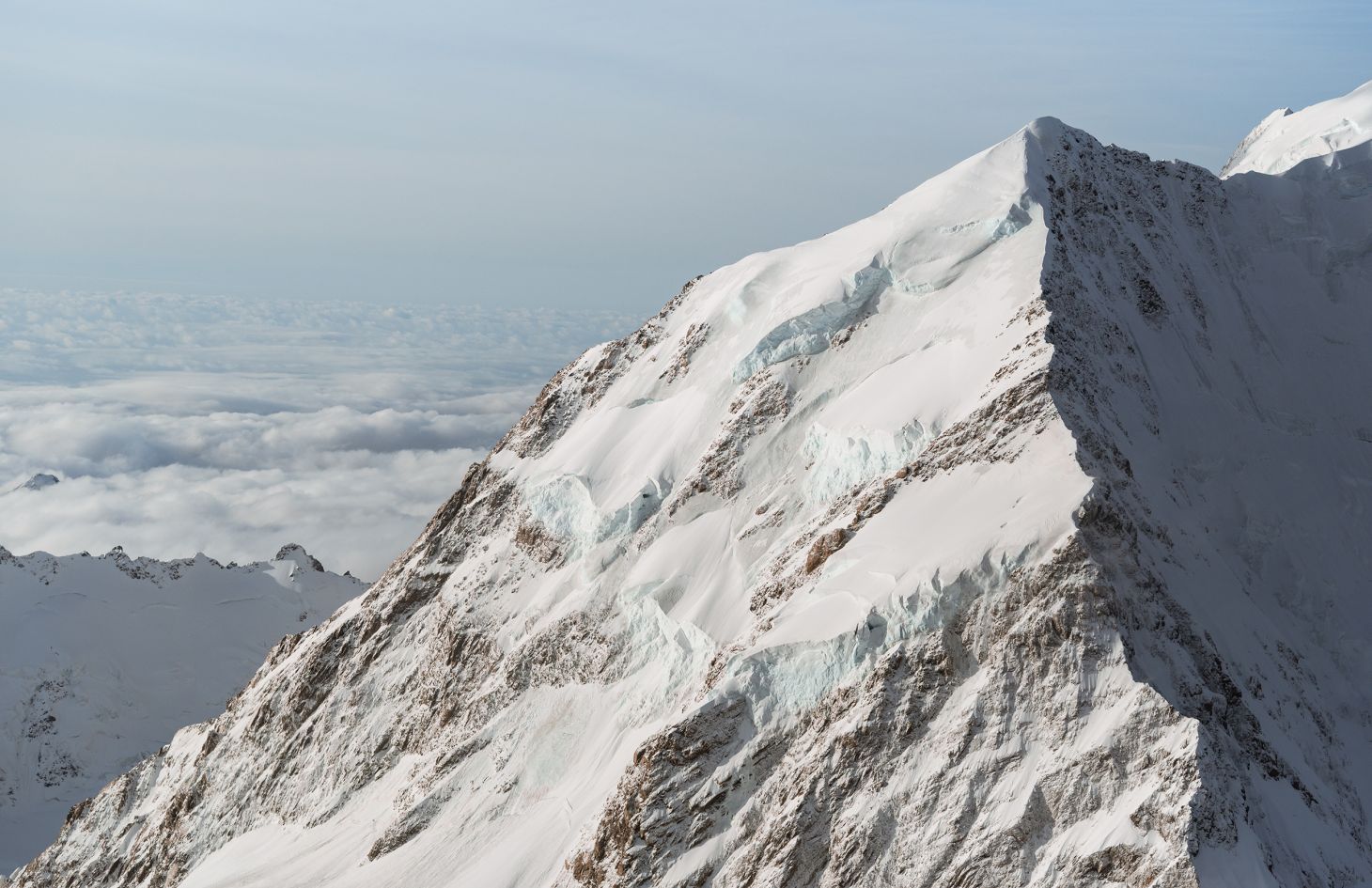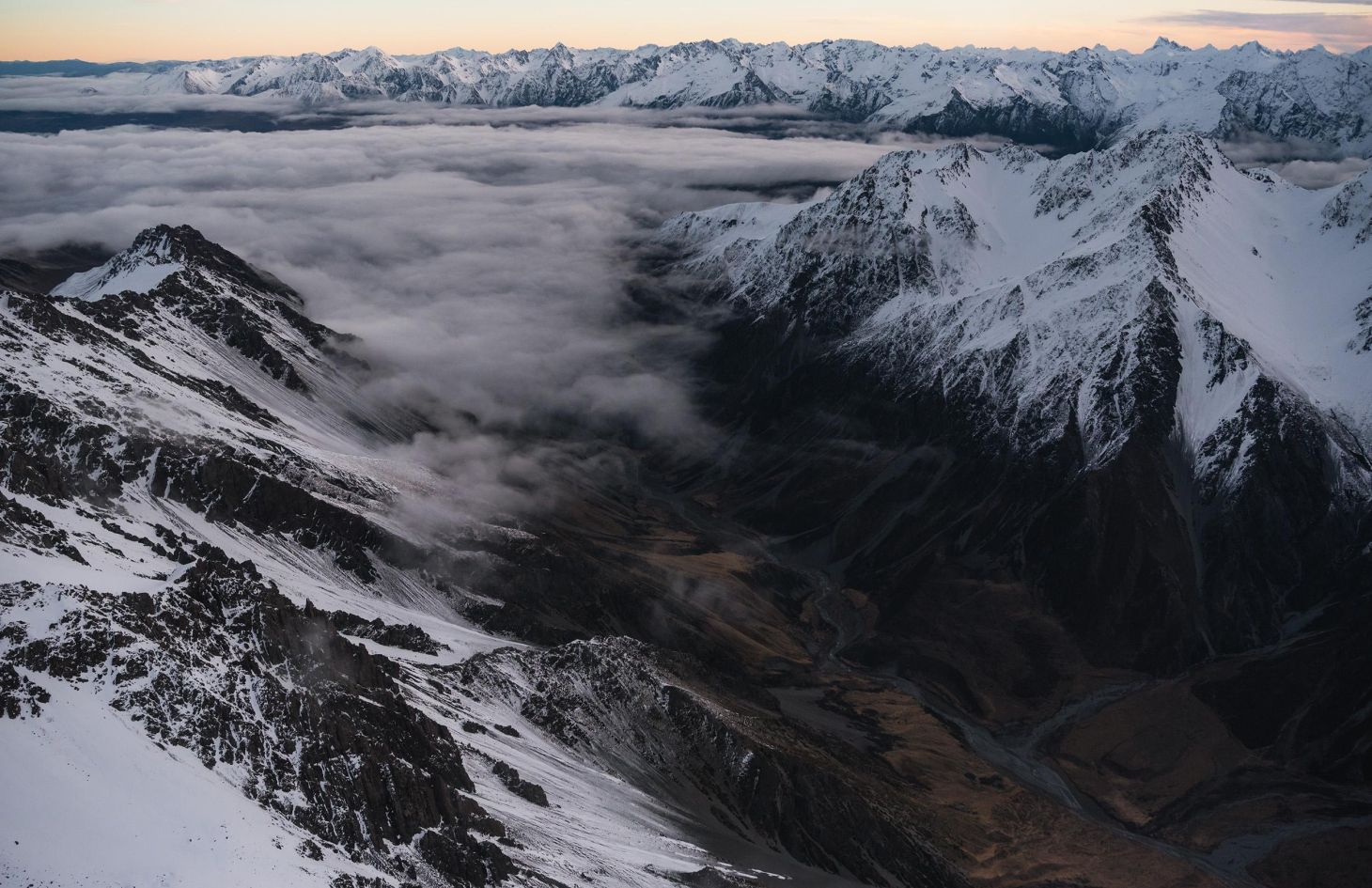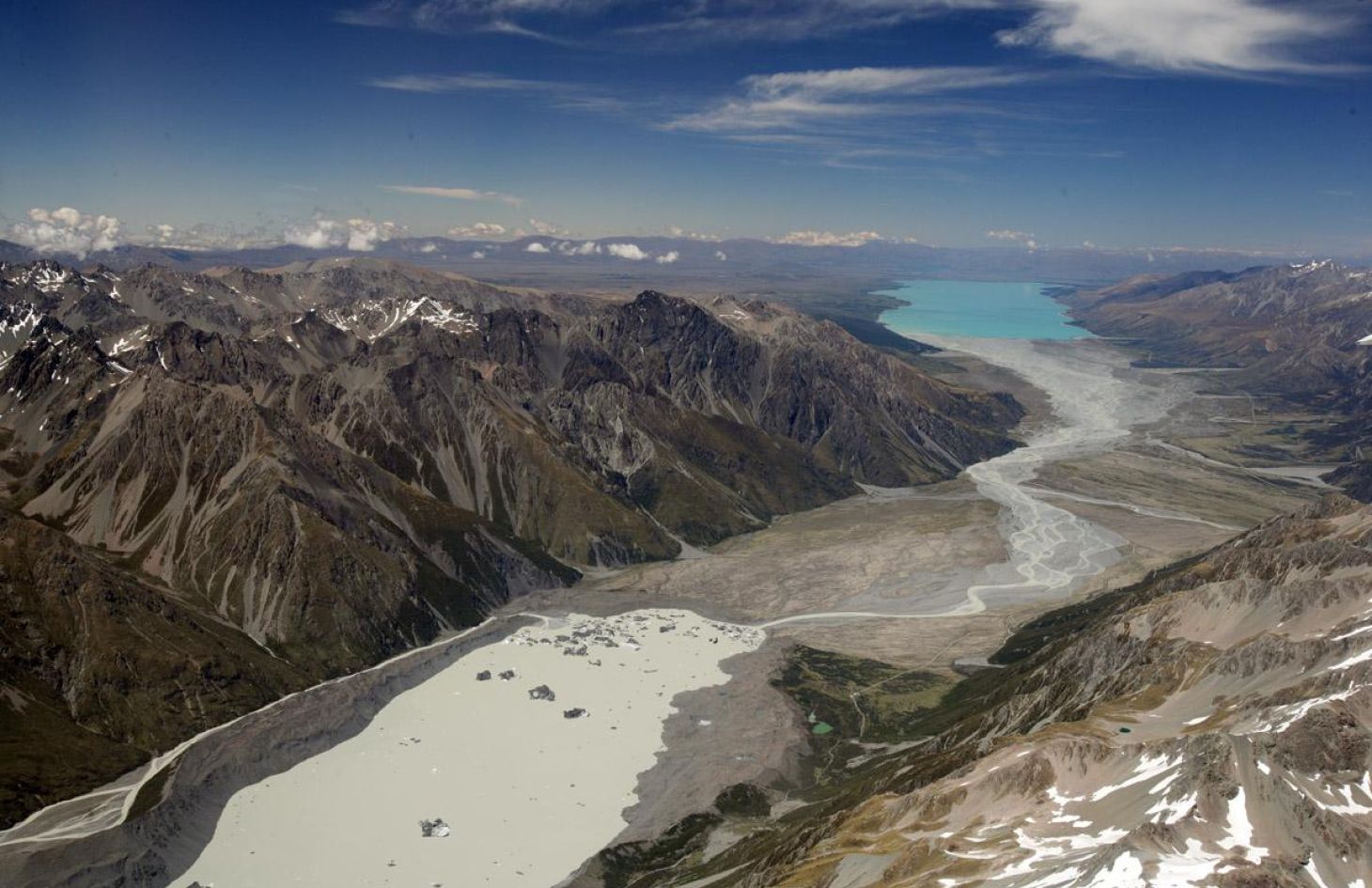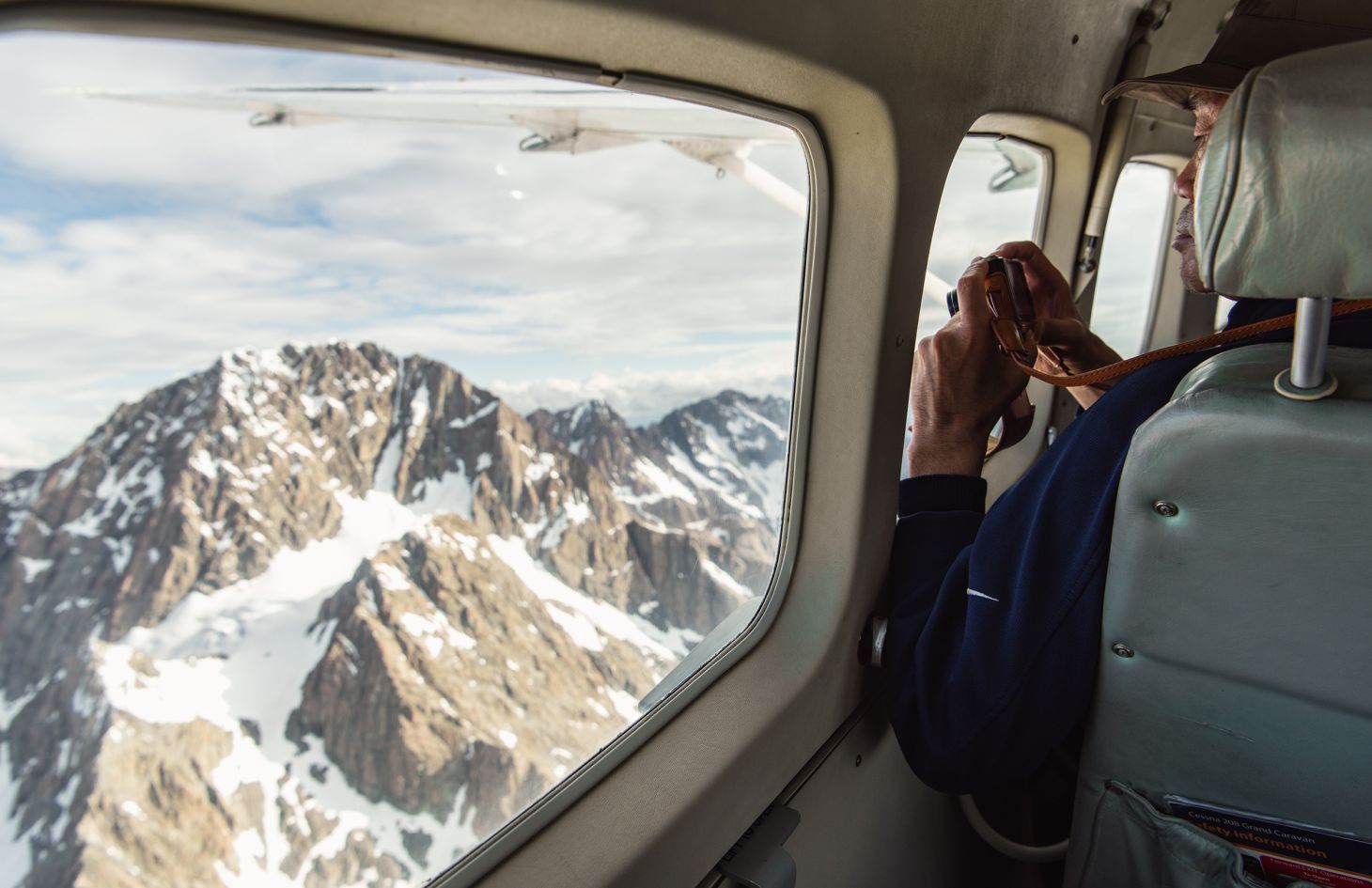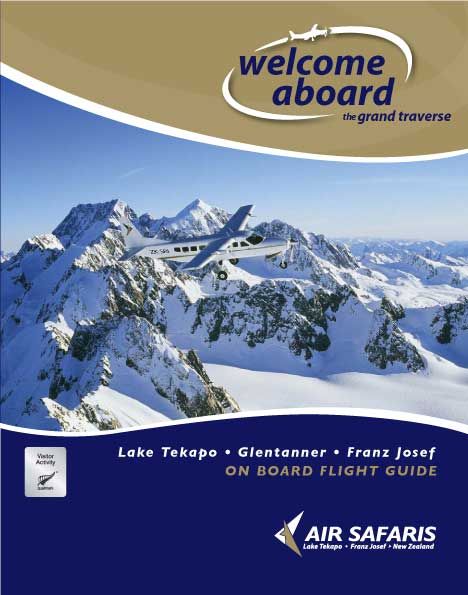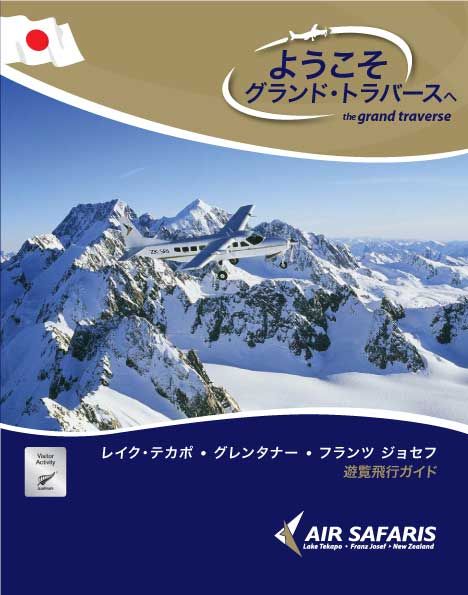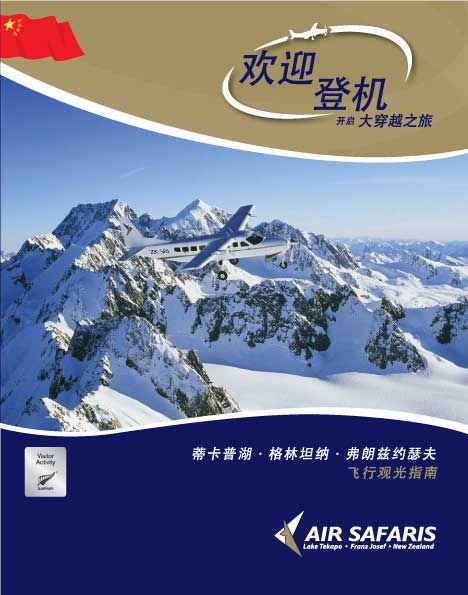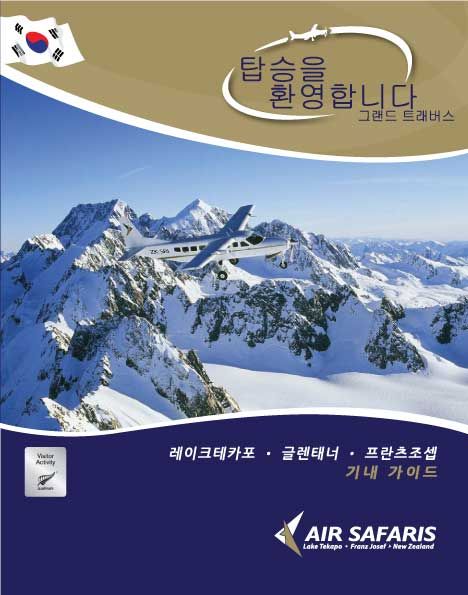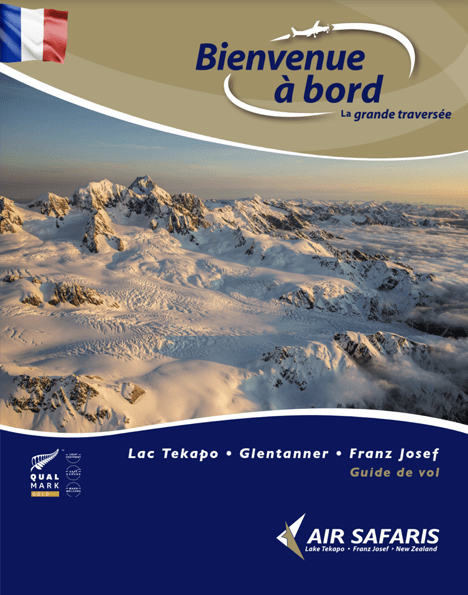Scenic Flights
The Grand Traverse
Price List
| Adult | Child | ||
|---|---|---|---|
Lake Tekapo returning to Lake Tekapo | NZ$495 | NZ$395 | Book |
Franz Josef returning to Franz Josef | NZ$495 | NZ$395 | Book |
Glentanner returning to Glentanner | NZ$520 | NZ$420 | Enquire |
Inter aiport options (including Tekapo, Glentanner, Mt Cook & Pukaki) | NZ$560 | NZ$450 | Enquire |
A child is aged 3 – 13 years inclusive
*prices valid from 1st October 2025 to 30th September 2026.
Experience the Grand Traverse with Air Safaris
The Grand Traverse is the “flight of a lifetime”, exploring the incredible world heritage Aoraki Mount Cook and Westland National Parks. See New Zealand’s most spectacular alpine scenery, from snowy mountain ranges and turquoise lakes, to epic glaciers and amazing ice fields flowing through West Coast rainforests, to the wild Tasman Sea!
The highlights of the Grand Traverse flight include:
-
New Zealand’s highest mountains and largest glaciers – including Aoraki Mount Cook and the Tasman Glacier
-
Beautiful turquoise glacial lakes, golden tussock lands, and the braided river systems of the Mackenzie basin
-
Remote High Country Sheep Stations, glacial valleys, and landforms
-
The Aoraki Mount Cook National Park – a magical world of permanent ice and snow
-
The Westland Tai Poutini National Park with the magnificent Franz Josef and Fox Glaciers surrounded by rainforests, and the wild yet beautiful Tasman Sea.
Our aircraft are ideal for New Zealand’s conditions, with a window seat for every passenger and have wings-above to ensure clear views of the amazing scenery. Your friendly pilot will provide an informative and enjoyable commentary, and all passengers get a copy of our multi-language flight-guide
The Grand Traverse is approximately 50 minutes of flying time, but please allow one hour in total.
Please advise us if you are over 130kg so we can make the required plans to avoid disappointment.
Grand Traverse
Flight Maps

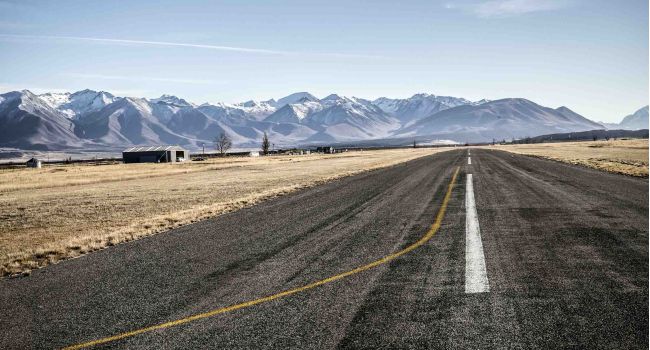
Pukaki Airport
Lake Pukaki Airport is located on State Highway 8, three minutes from the town of Twizel. Air Safaris has a small base there and can pick up or drop off passengers before or after the Grand Traverse.
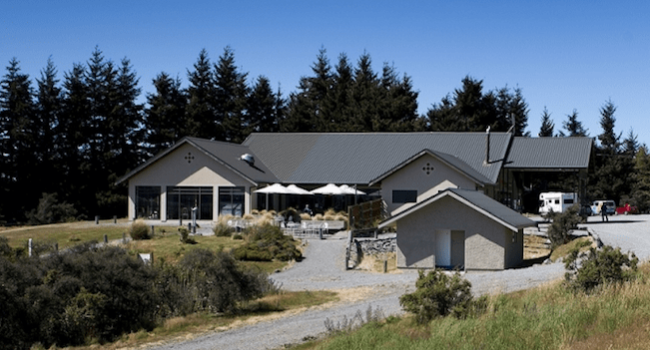
Glentanner Park
Glentanner Park Airport is located only 18km’s from Aoraki Mt Cook village. Air Safaris use Glentanner for inter airport pick up or drop offs before or after the Grand Traverse. This is especially convenient for tours operating to a tight schedule.
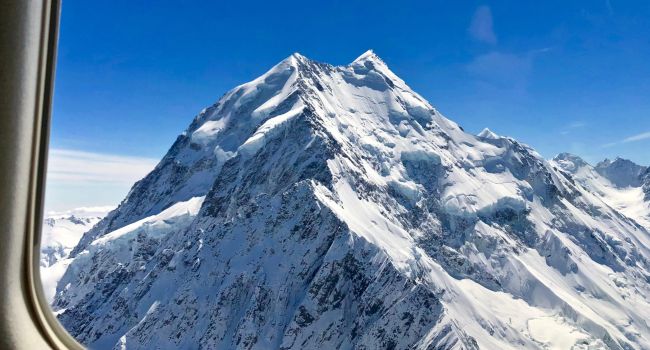
Mount Cook Airport
Mt Cook Airport is close to Aoraki Mt Cook village. Air Safaris use Mt Cook for inter airport pick up or drop offs before or after the Grand Traverse. This is especially convenient for tours operating to a tight schedule.

Air Safaris Franz Josef Airport
Situated in the heart of glacier country. Air Safaris owns and operates an airfield approximately 8km west of the Franz Josef township and a bookings and information office in the Franz Josef town centre.
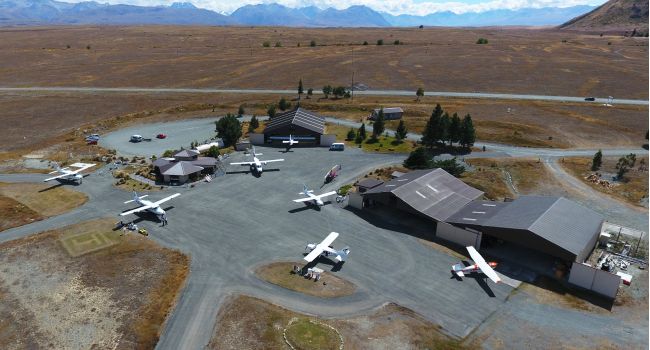
Air Safaris Lake Tekapo Airport
Air Safaris main base and airport facility (since 1975) is located alongside the main highway 4km west of the Lake Tekapo township. Our airport has plenty of free parking, toilets, WiFi, coffee and has a great area for non fliers to sit and enjoy the view. A sales and information office is situated centrally within the small township.

Lake Pukaki
Lake Pukaki is the largest of the three glacial lakes in the Mackenzie basin. It’s fed from the Tasman Glacier via the braided Tasman River. On clear days the views across Lake Pukaki to Aoraki Mt Cook are stunning. It has a maximum depth of 70m and like Lake Tekapo and Lake Ohau has the distinctive turquoise blue colour created by finely ground glacial rocks called “rock flour”.

Aoraki Mount Cook
“Aoraki” – the cloud piercer. New Zealand’s highest mountain at 3754m (12,316 ft). Permanently covered in snow and ice, it was first climbed on Christmas day in 1894. Get up close to Aoraki Mt Cook from your very own window seat on an Air Safaris Grand Traverse.

Mount Tasman
Mt Tasman is New Zealand’s second highest mountain at 3497m (11,475ft). The Balfour icefall and glacier on Mt Tasman’s western flank is just one of the stunning views you’ll see from an Air Safaris Grand Traverse.
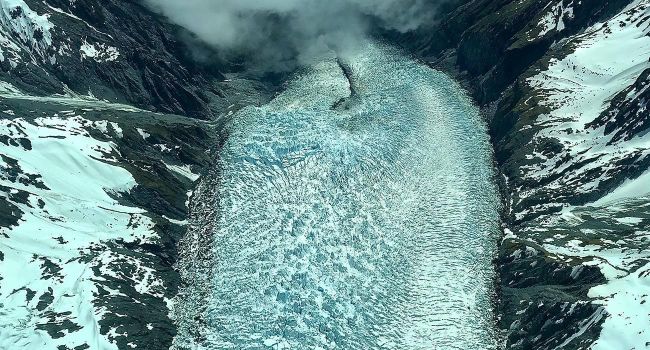
Fox Glacier
Fox Glacier / Te Moeka o Tuawe is 13km long descending from 2600m down to the rain forest just 300m above the Tasman Sea. The massive Fox Neve snow field is a stunning highlight on the Air Safaris Grand Traverse.
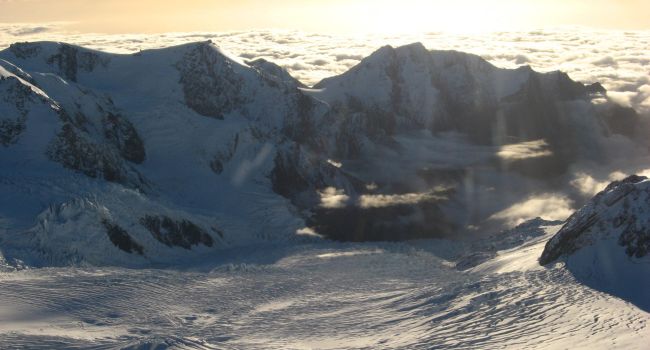
Franz Josef Glacier
The Franz Josef Glacier descends from the southern alps into the rain forest of the West Coast. Maori legend has it that the glacier was formed by “the tears of Hine Hukatere” when her lover Wawe was swept away in an avalanche. Viewing the glacier from above is a highlight of an Air Safaris Grand Traverse.
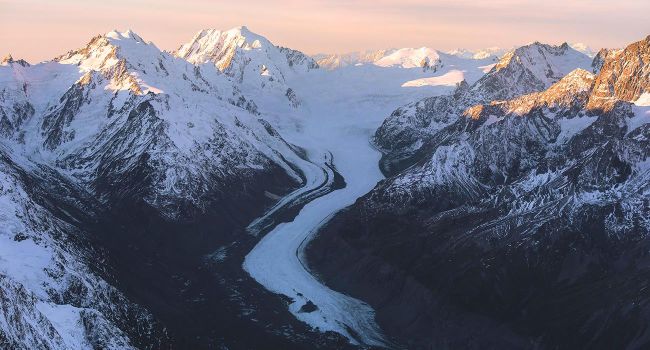
Tasman Glacier
29km long with ice up to 800m (2600ft) deep, the Tasman is New Zealand’s longest glacier. Moraine (rock and gravel scraped or fallen from the valley walls) covers the ice for much of its length. At its terminus is a glacial lake 150m deep often filled with giant floating ice bergs. Lake Tasman feeds the braided Tasman river and Lake Pukaki.
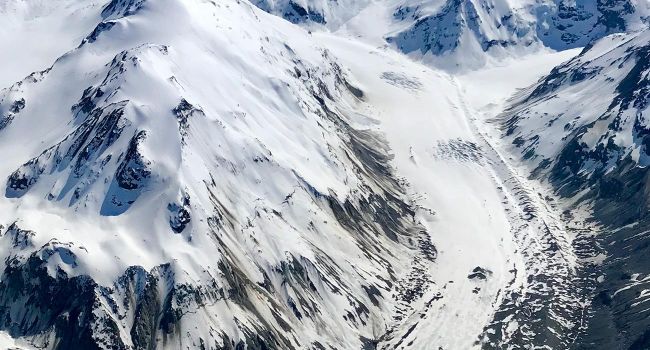
Murchison Glacier
At 16km’s in length, the Murchison Glacier is New Zealand’s second longest. It flows in parallel valleys the Tasman and Murchison Glaciers are separated by the Malte Brun range. This range is dominated by Mt Malte Brun 3170m (10,400 ft).
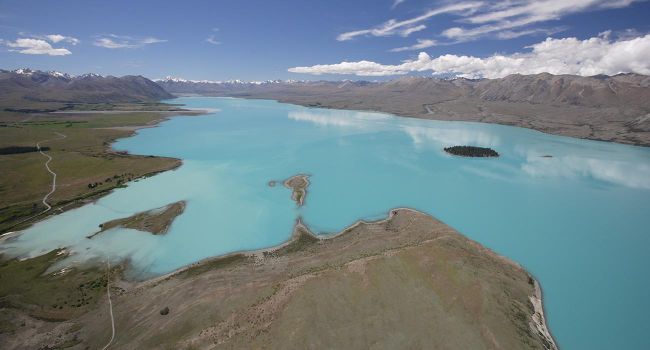
Lake Tekapo
Lake Tekapo covers the first part of your Air Safaris Grand Traverse. Glaciers grinding against rock produce a fine powder called “rock flour”. When washed into the lake this is what produces the stunning turquoise colour. Lake Tekapo is 120m deep and has an average temperature of 7 degrees C. In the summer months it is popular for boating, water sports and trout and salmon fishing.
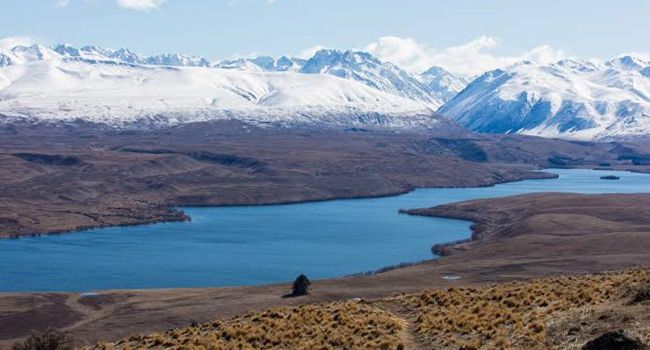
Lake Alexandrina
Famous for its rainbow and brown trout fishing, this spring fed lake provides a striking contrast to the turquoise blue glacial waters of Lake Tekapo. Rowing boats are the only mode of transport on Alexandrina as sail and motor boats are prohibited.
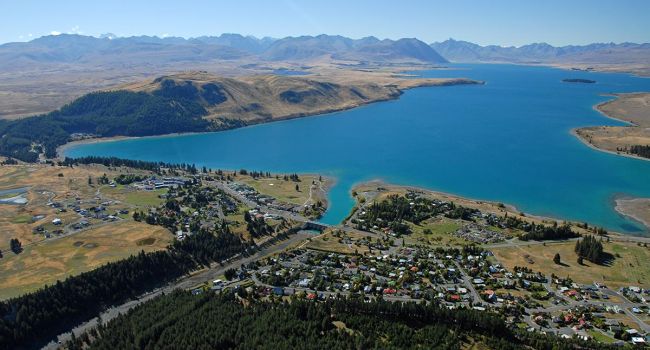
Lake Tekapo Village
Nestled on the southern shoreline of Lake Tekapo, the village is home to 350 permanent residents. It is dominated to the west by Mt John. Lake Tekapo village is the home of star gazing in New Zealand. Having one of the clearest night skies in the world it is an “International Dark Sky Reserve.” The village hosts thousands of visitors from all over the world. The “Church of the Good Shepherd” on the lakefront is the most photographed place in the country.
-
![]()
Pukaki Airport
Lake Pukaki Airport is located on State Highway 8, three minutes from the town of Twizel. Air Safaris has a small base there and can pick up or drop off passengers before or after the Grand Traverse.
-
![]()
Glentanner Park
Glentanner Park Airport is located only 18km’s from Aoraki Mt Cook village. Air Safaris use Glentanner for inter airport pick up or drop offs before or after the Grand Traverse. This is especially convenient for tours operating to a tight schedule.
-
![]()
Mount Cook Airport
Mt Cook Airport is close to Aoraki Mt Cook village. Air Safaris use Mt Cook for inter airport pick up or drop offs before or after the Grand Traverse. This is especially convenient for tours operating to a tight schedule.
-
![]()
Air Safaris Franz Josef Airport
Situated in the heart of glacier country. Air Safaris owns and operates an airfield approximately 8km west of the Franz Josef township and a bookings and information office in the Franz Josef town centre.
-
![]()
Air Safaris Lake Tekapo Airport
Air Safaris main base and airport facility (since 1975) is located alongside the main highway 4km west of the Lake Tekapo township. Our airport has plenty of free parking, toilets, WiFi, coffee and has a great area for non fliers to sit and enjoy the view. A sales and information office is situated centrally within the small township.
-
![]()
Lake Pukaki
Lake Pukaki is the largest of the three glacial lakes in the Mackenzie basin. It’s fed from the Tasman Glacier via the braided Tasman River. On clear days the views across Lake Pukaki to Aoraki Mt Cook are stunning. It has a maximum depth of 70m and like Lake Tekapo and Lake Ohau has the distinctive turquoise blue colour created by finely ground glacial rocks called “rock flour”.
-
![]()
Aoraki Mount Cook
“Aoraki” – the cloud piercer. New Zealand’s highest mountain at 3754m (12,316 ft). Permanently covered in snow and ice, it was first climbed on Christmas day in 1894. Get up close to Aoraki Mt Cook from your very own window seat on an Air Safaris Grand Traverse.
-
![]()
Mount Tasman
Mt Tasman is New Zealand’s second highest mountain at 3497m (11,475ft). The Balfour icefall and glacier on Mt Tasman’s western flank is just one of the stunning views you’ll see from an Air Safaris Grand Traverse.
-
![]()
Fox Glacier
Fox Glacier / Te Moeka o Tuawe is 13km long descending from 2600m down to the rain forest just 300m above the Tasman Sea. The massive Fox Neve snow field is a stunning highlight on the Air Safaris Grand Traverse.
-
![]()
Franz Josef Glacier
The Franz Josef Glacier descends from the southern alps into the rain forest of the West Coast. Maori legend has it that the glacier was formed by “the tears of Hine Hukatere” when her lover Wawe was swept away in an avalanche. Viewing the glacier from above is a highlight of an Air Safaris Grand Traverse.
-
![]()
Tasman Glacier
29km long with ice up to 800m (2600ft) deep, the Tasman is New Zealand’s longest glacier. Moraine (rock and gravel scraped or fallen from the valley walls) covers the ice for much of its length. At its terminus is a glacial lake 150m deep often filled with giant floating ice bergs. Lake Tasman feeds the braided Tasman river and Lake Pukaki.
-
![]()
Murchison Glacier
At 16km’s in length, the Murchison Glacier is New Zealand’s second longest. It flows in parallel valleys the Tasman and Murchison Glaciers are separated by the Malte Brun range. This range is dominated by Mt Malte Brun 3170m (10,400 ft).
-
![]()
Lake Tekapo
Lake Tekapo covers the first part of your Air Safaris Grand Traverse. Glaciers grinding against rock produce a fine powder called “rock flour”. When washed into the lake this is what produces the stunning turquoise colour. Lake Tekapo is 120m deep and has an average temperature of 7 degrees C. In the summer months it is popular for boating, water sports and trout and salmon fishing.
-
![]()
Lake Alexandrina
Famous for its rainbow and brown trout fishing, this spring fed lake provides a striking contrast to the turquoise blue glacial waters of Lake Tekapo. Rowing boats are the only mode of transport on Alexandrina as sail and motor boats are prohibited.
-
![]()
Lake Tekapo Village
Nestled on the southern shoreline of Lake Tekapo, the village is home to 350 permanent residents. It is dominated to the west by Mt John. Lake Tekapo village is the home of star gazing in New Zealand. Having one of the clearest night skies in the world it is an “International Dark Sky Reserve.” The village hosts thousands of visitors from all over the world. The “Church of the Good Shepherd” on the lakefront is the most photographed place in the country.

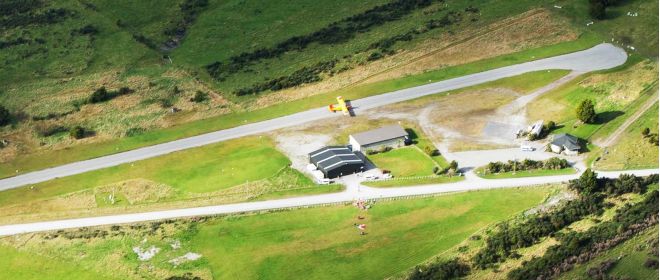
Air Safaris Franz Josef Airport
Situated in the heart of glacier country. Air Safaris owns and operates an airfield approximately 8km west of the Franz Josef township and a bookings and information office in the Franz Josef town centre.
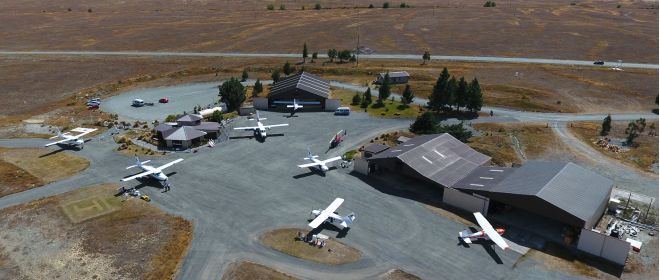
Air Safaris Lake Tekapo Airport
Air Safaris main base and airport facility (since 1975) is located alongside the main highway 4km west of the Lake Tekapo township. Our airport has plenty of free parking, toilets, WiFi, coffee and has a great area for non fliers to sit and enjoy the view. A sales and information office is situated centrally within the small township.
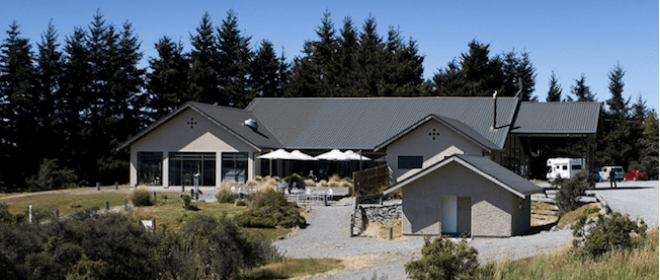
Glentanner Park
Glentanner Park Airport is located only 18km’s from Aoraki Mt Cook village. Air Safaris use Glentanner for inter airport pick up or drop offs before or after the Grand Traverse. This is especially convenient for tours operating to a tight schedule.
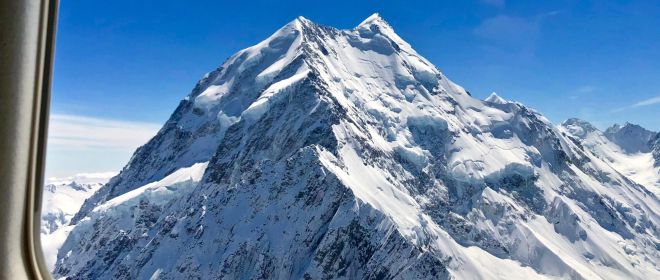
Mount Cook Airport
Mt Cook Airport is close to Aoraki Mt Cook village. Air Safaris use Mt Cook for inter airport pick up or drop offs before or after the Grand Traverse. This is especially convenient for tours operating to a tight schedule.

Franz Josef Glacier
The Franz Josef Glacier descends from the southern alps into the rain forest of the West Coast. Maori legend has it that the glacier was formed by “the tears of Hine Hukatere” when her lover Wawe was swept away in an avalanche. Viewing the glacier from above is a highlight of an Air Safaris Grand Traverse.
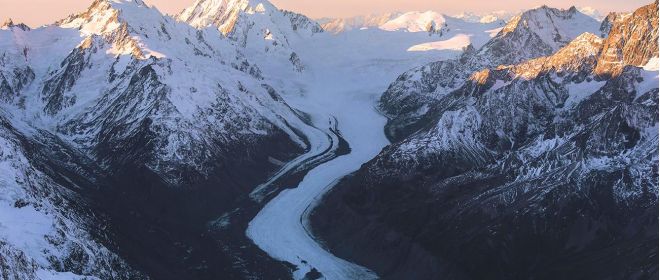
Tasman Glacier
29km long with ice up to 800m (2600ft) deep, the Tasman is New Zealand’s longest glacier. Moraine (rock and gravel scraped or fallen from the valley walls) covers the ice for much of its length. At its terminus is a glacial lake 150m deep often filled with giant floating ice bergs. Lake Tasman feeds the braided Tasman river and Lake Pukaki.

Murchison Glacier
At 16km’s in length, the Murchison Glacier is New Zealand’s second longest. It flows in parallel valleys the Tasman and Murchison Glaciers are separated by the Malte Brun range. This range is dominated by Mt Malte Brun 3170m (10,400 ft).

Lake Tekapo
Lake Tekapo covers the first part of your Air Safaris Grand Traverse. Glaciers grinding against rock produce a fine powder called “rock flour”. When washed into the lake this is what produces the stunning turquoise colour. Lake Tekapo is 120m deep and has an average temperature of 7 degrees C. In the summer months it is popular for boating, water sports and trout and salmon fishing.

Lake Alexandrina
Famous for its rainbow and brown trout fishing, this spring fed lake provides a striking contrast to the turquoise blue glacial waters of Lake Tekapo. Rowing boats are the only mode of transport on Alexandrina as sail and motor boats are prohibited.
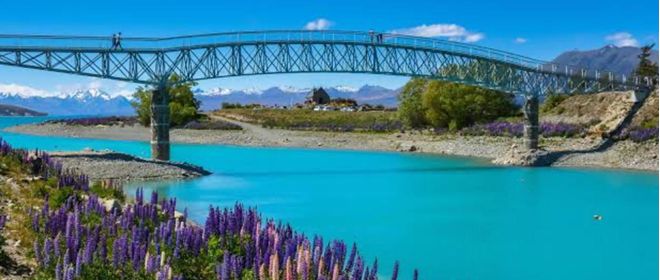
Lake Tekapo Village
Nestled on the southern shoreline of Lake Tekapo, the village is home to 350 permanent residents. It is dominated to the west by Mt John. Lake Tekapo village is the home of star gazing in New Zealand. Having one of the clearest night skies in the world it is an “International Dark Sky Reserve.” The village hosts thousands of visitors from all over the world. The “Church of the Good Shepherd” on the lakefront is the most photographed place in the country.

Lake Pukaki
Lake Pukaki is the largest of the three glacial lakes in the Mackenzie basin. It’s fed from the Tasman Glacier via the braided Tasman River. On clear days the views across Lake Pukaki to Aoraki Mt Cook are stunning. It has a maximum depth of 70m and like Lake Tekapo and Lake Ohau has the distinctive turquoise blue colour created by finely ground glacial rocks called “rock flour”.
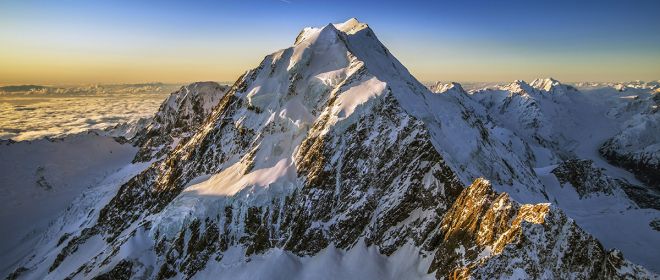
Aoraki Mount Cook
“Aoraki” – the cloud piercer. New Zealand’s highest mountain at 3754m (12,316 ft). Permanently covered in snow and ice, it was first climbed on Christmas day in 1894. Get up close to Aoraki Mt Cook from your very own window seat on an Air Safaris Grand Traverse.
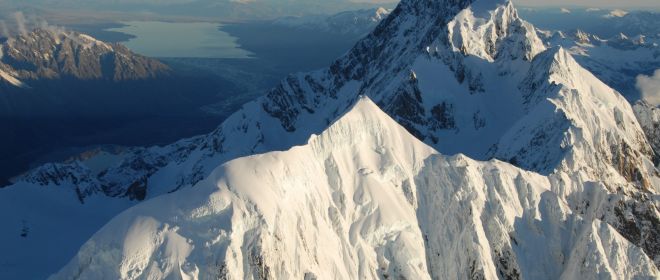
Mount Tasman
Mt Tasman is New Zealand’s second highest mountain at 3497m (11,475ft). The Balfour icefall and glacier on Mt Tasman’s western flank is just one of the stunning views you’ll see from an Air Safaris Grand Traverse.
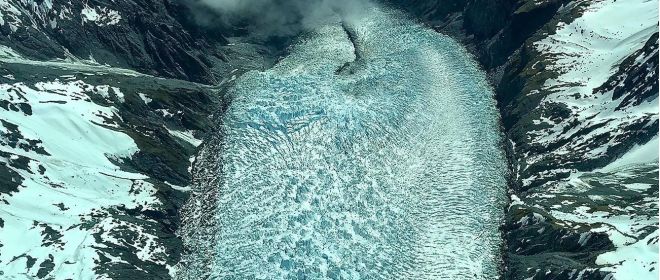
Fox Glacier
Fox Glacier / Te Moeka o Tuawe is 13km long descending from 2600m down to the rain forest just 300m above the Tasman Sea. The massive Fox Neve snow field is a stunning highlight on the Air Safaris Grand Traverse.
-
![]()
Air Safaris Franz Josef Airport
Situated in the heart of glacier country. Air Safaris owns and operates an airfield approximately 8km west of the Franz Josef township and a bookings and information office in the Franz Josef town centre.
-
![]()
Air Safaris Lake Tekapo Airport
Air Safaris main base and airport facility (since 1975) is located alongside the main highway 4km west of the Lake Tekapo township. Our airport has plenty of free parking, toilets, WiFi, coffee and has a great area for non fliers to sit and enjoy the view. A sales and information office is situated centrally within the small township.
-
![]()
Glentanner Park
Glentanner Park Airport is located only 18km’s from Aoraki Mt Cook village. Air Safaris use Glentanner for inter airport pick up or drop offs before or after the Grand Traverse. This is especially convenient for tours operating to a tight schedule.
-
![]()
Mount Cook Airport
Mt Cook Airport is close to Aoraki Mt Cook village. Air Safaris use Mt Cook for inter airport pick up or drop offs before or after the Grand Traverse. This is especially convenient for tours operating to a tight schedule.
-
![]()
Franz Josef Glacier
The Franz Josef Glacier descends from the southern alps into the rain forest of the West Coast. Maori legend has it that the glacier was formed by “the tears of Hine Hukatere” when her lover Wawe was swept away in an avalanche. Viewing the glacier from above is a highlight of an Air Safaris Grand Traverse.
-
![]()
Tasman Glacier
29km long with ice up to 800m (2600ft) deep, the Tasman is New Zealand’s longest glacier. Moraine (rock and gravel scraped or fallen from the valley walls) covers the ice for much of its length. At its terminus is a glacial lake 150m deep often filled with giant floating ice bergs. Lake Tasman feeds the braided Tasman river and Lake Pukaki.
-
![]()
Murchison Glacier
At 16km’s in length, the Murchison Glacier is New Zealand’s second longest. It flows in parallel valleys the Tasman and Murchison Glaciers are separated by the Malte Brun range. This range is dominated by Mt Malte Brun 3170m (10,400 ft).
-
![]()
Lake Tekapo
Lake Tekapo covers the first part of your Air Safaris Grand Traverse. Glaciers grinding against rock produce a fine powder called “rock flour”. When washed into the lake this is what produces the stunning turquoise colour. Lake Tekapo is 120m deep and has an average temperature of 7 degrees C. In the summer months it is popular for boating, water sports and trout and salmon fishing.
-
![]()
Lake Alexandrina
Famous for its rainbow and brown trout fishing, this spring fed lake provides a striking contrast to the turquoise blue glacial waters of Lake Tekapo. Rowing boats are the only mode of transport on Alexandrina as sail and motor boats are prohibited.
-
![]()
Lake Tekapo Village
Nestled on the southern shoreline of Lake Tekapo, the village is home to 350 permanent residents. It is dominated to the west by Mt John. Lake Tekapo village is the home of star gazing in New Zealand. Having one of the clearest night skies in the world it is an “International Dark Sky Reserve.” The village hosts thousands of visitors from all over the world. The “Church of the Good Shepherd” on the lakefront is the most photographed place in the country.
-
![]()
Lake Pukaki
Lake Pukaki is the largest of the three glacial lakes in the Mackenzie basin. It’s fed from the Tasman Glacier via the braided Tasman River. On clear days the views across Lake Pukaki to Aoraki Mt Cook are stunning. It has a maximum depth of 70m and like Lake Tekapo and Lake Ohau has the distinctive turquoise blue colour created by finely ground glacial rocks called “rock flour”.
-
![]()
Aoraki Mount Cook
“Aoraki” – the cloud piercer. New Zealand’s highest mountain at 3754m (12,316 ft). Permanently covered in snow and ice, it was first climbed on Christmas day in 1894. Get up close to Aoraki Mt Cook from your very own window seat on an Air Safaris Grand Traverse.
-
![]()
Mount Tasman
Mt Tasman is New Zealand’s second highest mountain at 3497m (11,475ft). The Balfour icefall and glacier on Mt Tasman’s western flank is just one of the stunning views you’ll see from an Air Safaris Grand Traverse.
-
![]()
Fox Glacier
Fox Glacier / Te Moeka o Tuawe is 13km long descending from 2600m down to the rain forest just 300m above the Tasman Sea. The massive Fox Neve snow field is a stunning highlight on the Air Safaris Grand Traverse.
Grand Traverse
Flight Maps
